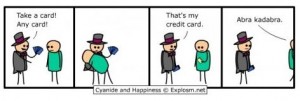It is well known that your humble blogger does not like to post cases in which the applicant is victorious and the defendant suffers defeat. But, if this post serves to lull applicants’ attorneys into a false sense of security, or to help a defendant avoid relying on similar facts to proceed to trial, then your humble blogger is happy to do his part to make the world slightly more safe for employers. To the seven applicants’ attorneys that read this blog – it’s not a false sense of security at all, go ahead and lower your guard…
The case I bring to you is that of Timothy Sabedra v. Magic Messenger, Inc., which was recently denied review by the Court of Appeal. The attempted magic trick was to turn employee-truck drivers into independent contractors. But a white rabbit went into the hat, and the same white rabbit came out.
The case essentially turned on the primary issue of whether the applicant was an independent contractor or an employee.
Applicant worked as a truck driver for Magic Messenger. He signed an independent contractor agreement, provided his own truck and insurance, and paid for all maintenance on the truck. He was paid a portion of the invoices he issued on his own letterhead, although the invoices were made payable to Magic Messenger. On the other hand, he wore Magic Messenger’s logos and uniforms, and there was dispute as to whether he worked for Magic Messenger exclusively.
Interestingly, there was testimony from the defense to the effect that they recruited drivers with 24-26 foot trucks, and that Magic Messenger had no such trucks of its own.
The Workers’ Compensation Judge found applicant to be an independent contractor, but the Workers’ Compensation Appeals Board reversed.
Reviewing the record, the WCAB found that applicant was under such control of the defendant, so as to negate any claim of independent contractor status. Of particular importance was applicant’s subjective belief that he could neither reject assignments nor conduct his own business in addition to the tasks set out by Magic Messenger.
But wait a minute – the WCAB has held that the subjective mental state of an injured worker does not affect the objective facts. After all, remember the jail-house case? The fact that the inmate in the Espinoza case wanted to work did not change the fact that he was a compelled worker and not entitled to workers’ compensation coverage.
The WCAB has held before that you can’t blatantly contract out of workers’ comp. this is by no means a clear-cut case. A lot of the factors here were in favor of an independent contractor arrangement, and the thrust of applicant’s position was that he believed he couldn’t refuse assignments because he heard rumors he would be punished (mind you, he didn’t offer any witnesses or instances, but just his own gossip).
The WCJ was on the ground and watched the witnesses testify, and, in your humble blogger’s most humble of humble opinions, the WCJ should have received the deference of the WCAB on this one.
Now, here’s an interesting though – what if, as a condition of employment, Magic Messenger required all its drivers to get workers’ compensation insurance for themselves? Just something to consider for all the employers out there looking to avoid “employing” every independent contractor they hire.

